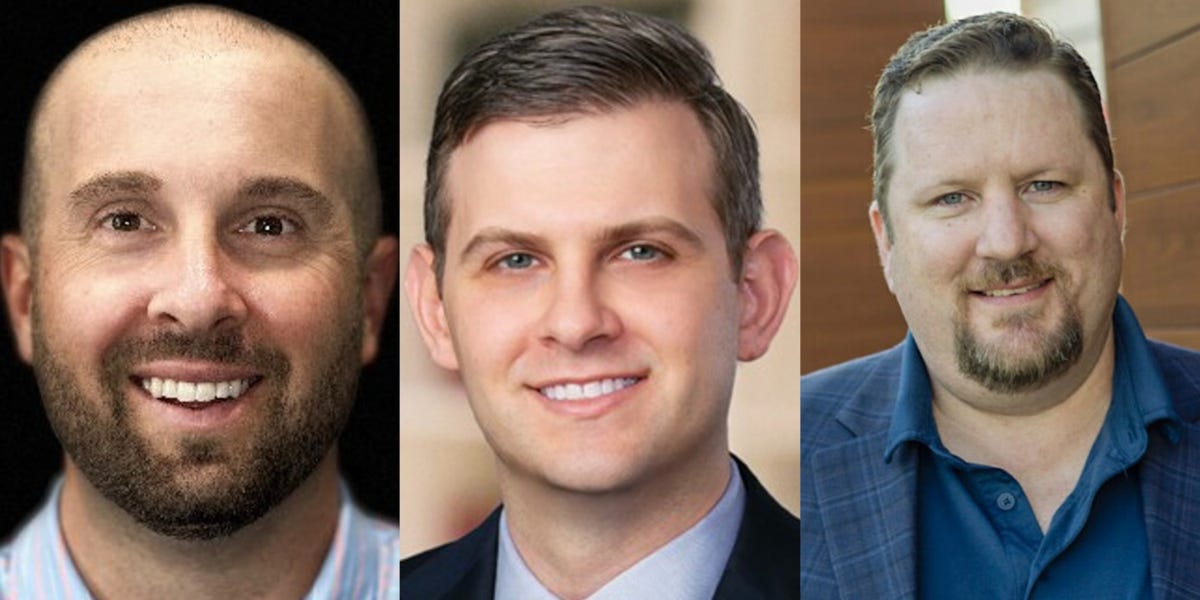While much of the internet has been lamenting the slow demise of X (formerly Twitter) since Elon Musk’s takeover, some businesses are still thriving on the platform.
That’s the case with SMB Law, a boutique law firm focused on small businesses founded by Eric Pacifici, Kevin Henderson, and Sam Rosati in 2022.
“We’ve seen overall engagement drop on Twitter, but the quality of engagement and leads, not necessarily,” Henderson told Insider.
The firm said its business is skyrocketing — it’s helped buy and sell small businesses in deals valued at $857 million since its inception, with $783 million in 2023 alone, and worked with a total of 271 clients.
The initiative to start SMB Law came from Pacifici. He had created an account on X in 2021 (when it was still Twitter). At the time, he was working in Big Law and was looking to purchase a small business himself.
“There’s a really robust small-business community on Twitter called SMB Twitter, or SMB X,” Pacifici told Insider. “Nobody’s trying to build Uber, they’re trying to buy HVAC companies, tree-trimming businesses, commercial-cleaning businesses.”
Pacifici began networking and discussing small-business law under the anonymous handle @SMB_attorney, and his account quickly gained a following (it now has 95,000 followers).
The more he shared about law and his life, the more he established himself as a reputable voice in the small-business community on the platform, and began receiving dozens of requests from people to help with deals. He decided it was worth going out on his own.
He recruited fellow attorney and friend Henderson, and Rosati, who they met on social media. The three quit their jobs and founded SMB in July 2022.
“We felt like we were jumping off of a proverbial cliff in making this decision,” Pacifici said. “About a week before we officially launched, I was laughing in the shower thinking how this will either be the most amazing decision I’ve ever made, or the stupidest thing anyone has ever done.”
Why SMB’s model works
Business for SMB comes from sharing expertise and being personable, rather than explicitly trying to make sales.
The partners try to break down complicated legal topics and give actionable advice in their content.
“We realized people are out there really hungry for high-quality information, and when you give them high-quality information, they’re willing to hire off social media,” Henderson said. “They no longer want to hire companies, they want to hire people.”
They also created a free masterclass discussing how to buy a business to provide their followers with practical knowledge in the area — which in turn helped market the firm.
And after listening to their followers’ requests, SMB decided to operate with a different business model than many law firms, charging a retainer fee as opposed to an hourly rate. They believe that having this structure makes clients more comfortable working with them without worrying about how much each interaction with the attorneys will cost.
“We have product-market fit because we have that community support in building this business,” Pacifici said. “They built it. We had thousands of people saying, ‘Structure your fees this way, forget about hourly billing.'”
Denisse and Evelin Montenegro, the owners of landscaping company Mean Green Lawn and Landscape, told Insider that having fees structured this way made them feel more comfortable reaching out to SMB when they had questions or needed advice during the process of buying their business.
Business beyond X
Despite the continued changes to X — most recently, the upcoming introduction of new paid subscription tiers — Henderson and Pacifici said business for them continues to be strong on the platform. At the same time, they are making an effort to diversify their content strategy.
They’re expanding to other platforms like LinkedIn, where their latest hire, Eli Albrecht, also known as the “Law Dad,” has 43,000 followers.
They’re also bringing business offline, building reputation in legal circles outside of the online small-business community.
“I think we’ve done a good job of using social media to get pretty ingrained in our space, well beyond Twitter,” Pacifici said. “If it went away tomorrow, the phone would definitely ring less, but I don’t know how much less.”
Read the full article here





